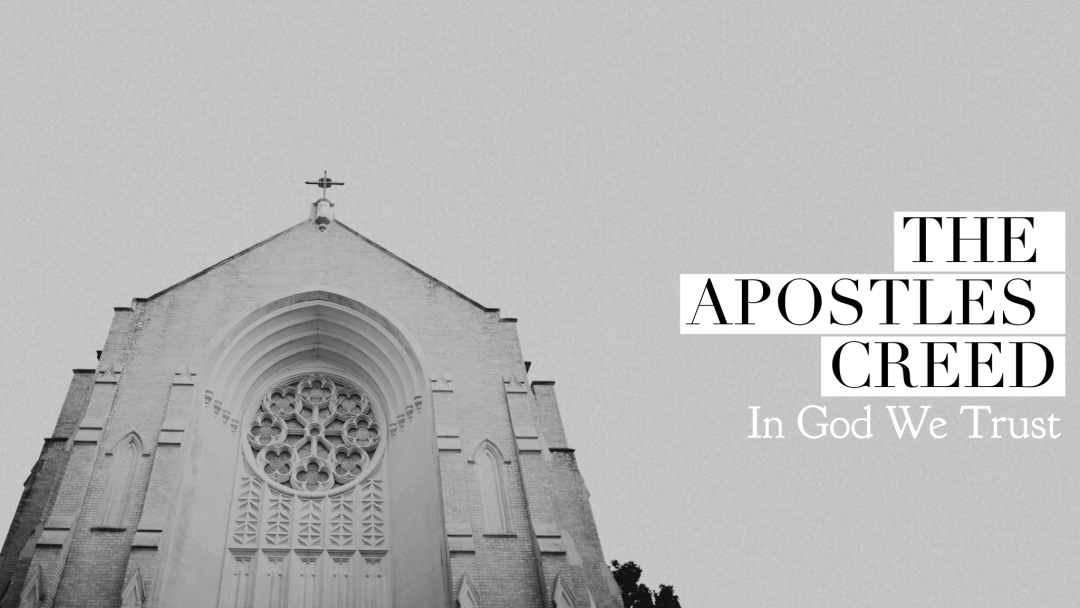
The Apostles’ Creed is a set of beliefs that lays out what a Christian holds to be true. It finds its roots in ancient baptismal confessions, and many first-century churches adopted variations of it as a means to sum up their beliefs. Catholicism considers it not only to be a creed but also a form of prayer. Other Christian traditions use an inquiring form of the creed as a confession of faith at the time of baptism. As Protestants, we understand it as a set of beliefs, and we can examine its creation in conformity to The Great Commission, where Jesus commands his followers to “go and make disciples of all nations, baptizing them in the name of the Father and of the Son and of the Holy Spirit” (Matthew 28.19 NIV).
The Apostles’ Creed has three distinct sections that address the triune Godhead. It starts with “I believe,” a statement of faith as well as a declaration of that faiths content (I believe in God the Father... and in Jesus Christ, his only Son... I believe in the Holy Spirit). But those words “I believe” can sometimes just be glossed over or even stated without a deep conviction, almost like a chant. “I believe” is performative; it’s not only a confession of faith but a stand that is counter-cultural.
I grew up in a Christian home, and there was no doubt that there was a God. My parents often talked about God, and so did their parents. We lived in a tightly knit Indian Pentecostal community, so we heard several stories from our friends and families about how God had answered their prayers or how he had moved on their behalf. As a child, God was part of our everyday life as if he was another member of our family. That’s why during my baptism, when the pastor confirmed my faith in God and in Jesus Christ the Son of God who died for my sins, I said, “Yes, I believe.”
Of course, I believed. How could it be otherwise?
Yet as I’ve grown older, I’ve seen how doubt creeps in. Can there really be an all-powerful being who loves us in such a way as described in our Bible? Is God real, or are these ancient stories? Stating “I believe” now requires more of me than as a child because something has eroded as I’ve gotten older. Years of adulthood can sometimes lead to an erosion of trust.
Modern culture contributes to individuals losing their sense of trust. Over the years, I’ve learned that politicians are not entirely trustworthy. There’s a high chance that the lofty promises they make during an election season may not be kept once they are in office. The sad part is that this has become an expectation. Even television news, once objective and trusted, now has a bias, and one often finds information slanted to one side or another. Reality TV is far from real and often edited and tailored to attract viewers. Advancements in technology have also contributed to the erosion of trust. If something a friend says seems far-fetched, there’s no need to trust him. We can simply Google articles to confirm that what was said was true or not. But can everything you read on the Internet be trusted? We, in the workforce, have become accustomed to employers using technology to micromanage employees. There’s no need to trust that someone is on track with their job tasks; it can be measured and proven. Surveillance technology is used to keep tabs on workers, citizens, and even family members.
Why this trend toward cynicism or seeking verified proof and away from trust? Because trusting is hard. It requires the giving of oneself over to another. It requires a dependence that the person trusted will keep his or her promises, and be truthful in what is said, and work with honesty and care. It requires a belief without immediate proof. We have a great fear of blindly trusting unknown things. But we still fall back on blind trust because we cannot verify everything. It would be an exhausting effort. It is impossible to live life without trust even though, as a society, we extensively seek for things to be verified.
Yet, when we say “I believe,” we are enacting a stand that is counter-cultural in attitude. I believe in God, without always having all the answers. It is my act of faith and trust in him. Though the world might think it blind faith, when we say “I believe,” we are also enacting a collective understanding that God has already proven himself faithful to his people. We know this through the truth of His Word as well as through our forefathers who had put their faith in him when they took their stand and said, “I believe.” Psalm 34.8 states, “Taste and see that the Lord is good.” God wants us to trust him first and then witness how he is worthy of our trust. He is good to keep his promises. Doubt will continue to creep into our lives, but we need to continue to place our trust in him, stating, “I believe in God the Father…. and in Jesus Christ, his only Son…. I believe in the Holy Spirit.”
I believe in what he has done for me and what he will do for me and what he can strengthen me to do.
I believe.
